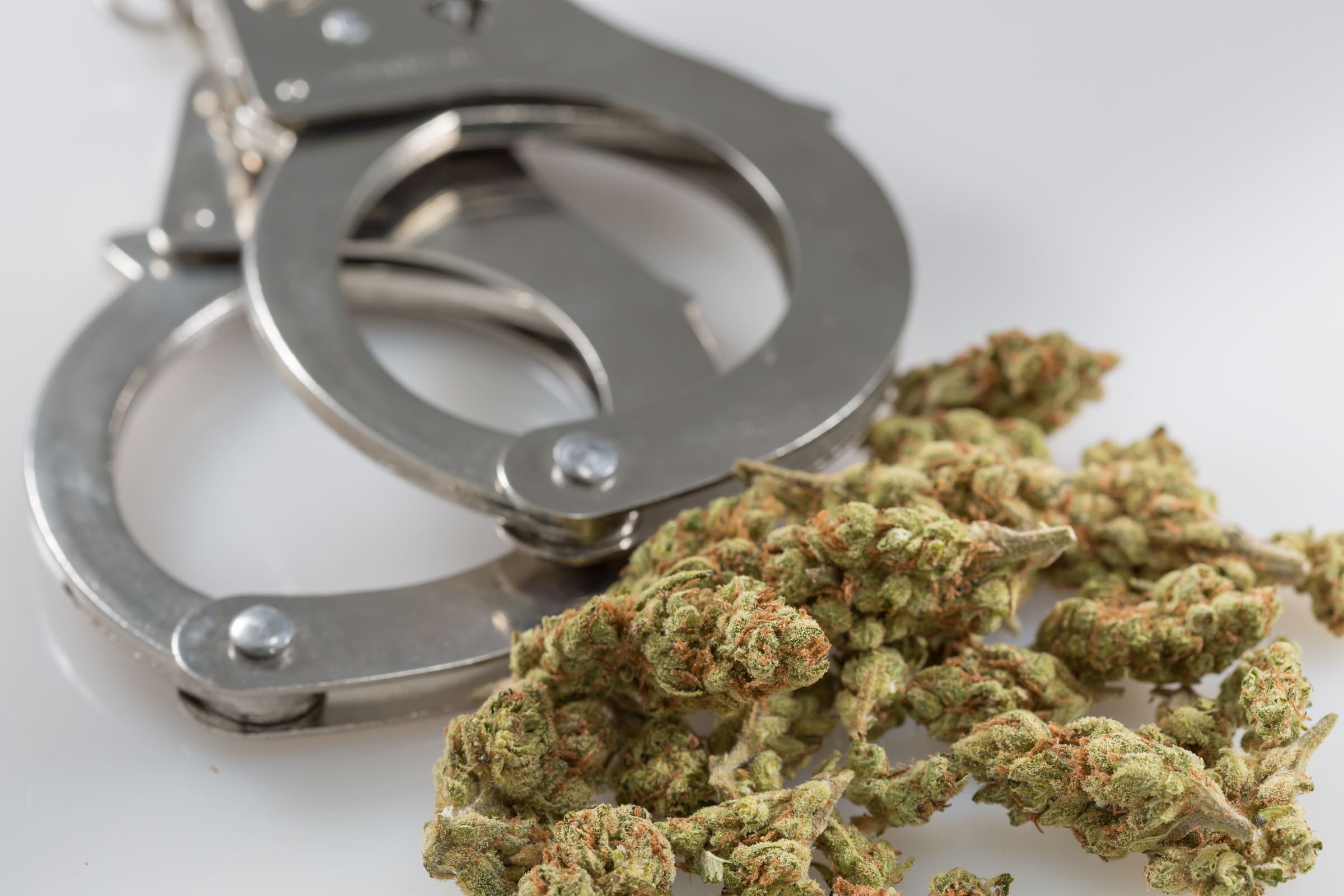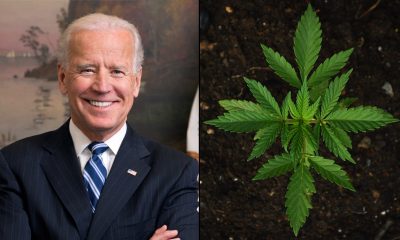Politics
Marijuana Conviction Felt Like A Death Sentence After Man Got COVID In Prison, He Tells Congress

The consequences of cannabis criminalization went on full display before a U.S. House of Representatives committee earlier this month when a man who contracted COVID-19 while incarcerated told lawmakers that he felt he had been effectively “sentenced to death for a first-time marijuana offense.”
Rep. Karen Bass (D-CA), chair of the House Judiciary Subcommittee on Crime, highlighted the story of the man who was convicted for allegedly selling cannabis in Kansas and then got coronavirus behind bars before exculpatory evidence came to surface that set him free.
In testimony pegged to a hearing on the Bureau of Prisons and the U.S. Marshals Service, Donte Westmoreland noted that while, after four years, he was released from the eight-year sentence because of the later evidentiary findings, he could still be put back on trial if Kansas prosecutors choose to do so.
He said he felt heartened, however, by recent Election Day votes at the state level to legalize marijuana.
Donte couldn't testify at our hearing on COVID in prisons this month but his words must be heard.
“In the end, I became infected with the virus. At that moment, I felt as if I was sentenced to death for a first-time marijuana offense.”
His full testimony is below. pic.twitter.com/nhrf2uZBII
— Congressmember Bass (@RepKarenBass) December 14, 2020
“I’ve been encouraged that the citizens of all five states that had cannabis reform initiatives on the ballot decided to approve those measures, including in conservative states,” he said.
Still, during the time he served, Westmoreland said he was cognizant of the unfairness that he was sitting in prison over a plant that was becoming legal in states across the country. For example, at one point while he was serving time, he watched a news segment on TV about medical cannabis being legalized in neighboring Missouri.
“Missouri, the state right next to me, had legalized medical cannabis and was issuing licenses for cultivators and retailers and talked about billions of dollars of wealth that was going to be generated by the legal industry,” he said. “But there I was sitting in prison for allegedly doing the same thing. What was criminal in Kansas was considered entrepreneurial in the bordering state of Missouri.”
Westmoreland also spoke about the racial disparities in drug law enforcement.
“My story is not unique. Today 40,000 people are serving prison sentences for non-violent cannabis convictions, even though cannabis has been completely legalized in ten states and made legal for medical purposes in a large majority of states,” he said. “These prisoners are disproportionately people of color, who are four times more likely to be arrested on cannabis charges than are white people.”
The COVID-19 outbreak in the prison was also revealing, he said.
“In the end, despite my best efforts I became infected with the virus. At the moment I felt as if I was sentenced to death for a first-time marijuana offense,” Westmoreland said. “I recovered, but five prisoners and two guards that were in the same facility died from COVID.”
Bass, who entered the testimony, led a congressional resolution in May that condemned law enforcement brutality amid protests over recent police killings of unarmed black people. That measure specifically emphasized the racial injustices of the war on drugs.
Read Westmoreland’s full testimony on his marijuana conviction below:
“Chairwoman Bass, Ranking Member Jordan, and Members of the House Judiciary Subcommittee on Crime:
My name is Donte Westmoreland. Six weeks ago, I was sitting in a cell at the Lansing Correctional Facility in Kansas, serving nearly an eight-year sentence for allegedly selling (one pound) of marijuana. I received this very lengthy sentence even though I had a no criminal history score. Fortunately, after serving nearly four years of my sentence, it came to light that prosecutors had concealed exculpatory evidence and my conviction was overturned.
I grew up in Stockton, California where I was raised by my grandmother. My mother had many challenges of her own which put me in position to be the sole supporter for our family. It was difficult maintaining a household financially I had my two younger brothers and my grandmother was receiving public assistance at the time. I focused mostly on being a caregiver for my grandmother, I was an athlete in high school and graduated in 2013. My dream was to keep moving forward with my education, but I knew that was unlikely given the circumstances of my situation. My grandmother encouraged me to visit colleges she would say,’’ There is more to life than just taking care of me, experience life you only have one’’. I knew deep down that was not possible, but it encouraged me to visit universities across the states, including Kansas.
This was interrupted by my arrest on March 8, 2016. I chose to take this case to jury trial because I felt I was not guilty of the crime in addition I was forced to go to trial with sick unprepared counsel. Right before my trial, my grandmother, the woman that raised me, suffered extreme distress. She ended up passing away during the trial and my 10 and 11-year-old brothers were placed in the foster care system, where they remain today. And on May 22, 2017, I was sentenced to serve nearly an eight-year prison term which was ironically my youngest brother’s birthday.
There have been a few moments that really brought everything home for me. One came while I was watching TV in prison and saw a news story saying that Missouri, the state right next to me, had legalized medical cannabis and was issuing licenses for cultivators and retailers and talked about billions of dollars of wealth that was going to be generated by the legal industry. But there I was sitting in prison for allegedly doing the same thing. What was criminal in Kansas was considered entrepreneurial in the bordering state of Missouri.
Another moment I can never forget came when I learned that COVID had infected other prisoners and guards in the prison I was incarcerated in. I did all I possibly could to protect myself, but that’s difficult when you have no control over the people who are housed with you, and you have no control over the air you breath and limited access to personal protective gear. It’s really terrifying, just waiting and hoping you don’t get it. In the end, despite my best efforts I became infected with the virus. At the moment I felt as if I was sentenced to death for a first-time marijuana offense. I recovered, but five prisoners and two guards that were in the same facility died from COVID.
I knew some of them personally—here today, gone tomorrow. I honestly did not know what my future held at that point.
My charges are still pending. It is still possible that I could be returned to prison to serve out my nearly 8-year sentence, if prosecutors in Kansas choose to put me on trial again, but I’ve been encouraged lately. I’ve been encouraged that the citizens of all five states that had cannabis reform initiatives on the ballot decided to approve those measures, including in conservative states like North Dakota [sic] and Mississippi. I have also been encouraged by the Biden Administration’s announcement that they intend to make federal cannabis reform a priority. And I’m really encouraged to have been invited to submit this written testimony to the House Judiciary Subcommittee on Crime.
My story is not unique. Today 40,000 people are serving prison sentences for non-violent cannabis convictions, even though cannabis has been completely legalized in ten states and made legal for medical purposes in a large majority of states. These prisoners are disproportionately people of color, who are four times more likely to be arrested on cannabis charges than are white people. Sometimes they were traveling from a state where their possession of cannabis would have been legal or just a minor offense but had the bad luck of being pulled over in one of the states that still has not passed reform legislation, as was the case with my arrest. Today, I am trying to rebuild my life and avoid being sent back to prison in Kansas. I cannot get time back, but I can make the most of the time I have now. I very much hope that this subcommittee and Congress will take whatever steps are necessary to make sure that in the future nobody else has the kind of experience that I had.
Thank you for the opportunity to share my story.”
Founder Of Anti-Marijuana Group Lobbies Biden To Nominate Him For White House Drug Czar
















